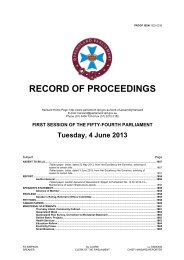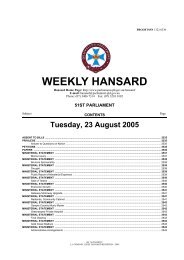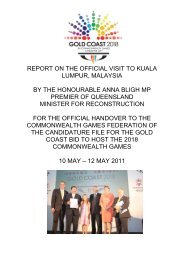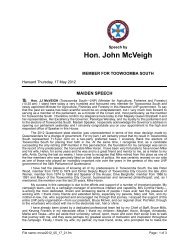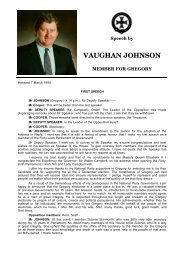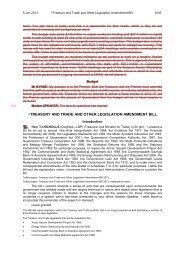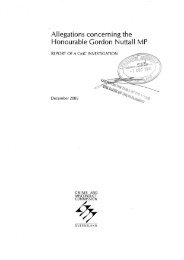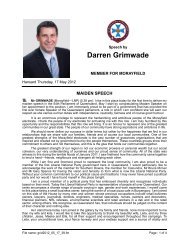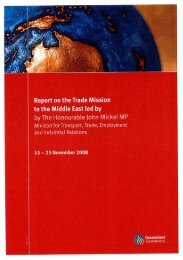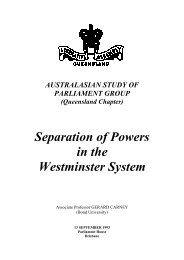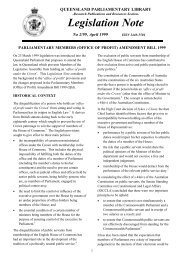Full transcript - Final - Queensland Parliament - Queensland ...
Full transcript - Final - Queensland Parliament - Queensland ...
Full transcript - Final - Queensland Parliament - Queensland ...
You also want an ePaper? Increase the reach of your titles
YUMPU automatically turns print PDFs into web optimized ePapers that Google loves.
9 Mar 1999 Land and Resources Tribunal Bill 361<br />
will be highly qualified in their respective areas<br />
of expertise. The mediation referee will ensure<br />
that the State's negotiation and litigation policy<br />
remains at the forefront of the tribunal's<br />
process. The mining referee will replace some<br />
of the dispute resolution functions of the<br />
current mining warden and will advise the<br />
tribunal about those functions previously<br />
performed by the warden.<br />
The tribunal is designed to operate in a<br />
quick and cost-effective manner for noncontentious<br />
matters, but will provide full and<br />
expert consideration of all issues when<br />
complex legal matters and rights are involved.<br />
The particular needs of Aboriginal and Torres<br />
Strait Islander people have largely directed the<br />
way in which the tribunal is shaped and the<br />
processes it will follow. The tribunal promotes<br />
and protects the rights of Aboriginal and Torres<br />
Strait Islander people in the following ways.<br />
Consistent with the Commonwealth approach,<br />
the <strong>Queensland</strong> Government intends that the<br />
tribunal will be independent. This is central to<br />
the administrative workings of the tribunal and<br />
will ensure that the impartiality of proceedings<br />
cannot be questioned. This is particularly<br />
important for Aboriginal and Torres Strait<br />
Islander people who have concerns—and I<br />
would say they are legitimate concerns, based<br />
on the treatment of this issue by the previous<br />
administration—that the person heading the<br />
tribunal and other members of the tribunal<br />
have no vested interest in a particular<br />
outcome. The tribunal will report separately to<br />
State <strong>Parliament</strong> through the Attorney-General<br />
and Minister for Justice. Indigenous people<br />
can feel assured that there will be no external<br />
influences when decisions are being made<br />
and the tribunal will make its decisions based<br />
on the facts, the law and fairness.<br />
It is the clear intention of the <strong>Queensland</strong><br />
Government that there will be no possibility of<br />
members of the tribunal having a conflict of<br />
interest. The legislation sets down strict<br />
guidelines outlining the management of<br />
pecuniary interests and possible conflicts of<br />
interest. This will ensure that presiding and<br />
non-presiding members do not have a bias in<br />
determining the outcome of proceedings and<br />
carry out their responsibilities with<br />
independence. Members of the tribunal must<br />
fully disclose any pecuniary interests or any<br />
conflicts of interest. This disclosure ensures<br />
that natural justice will be upheld.<br />
The legislation provides that a member of<br />
the National Native Title Tribunal can be a<br />
member of the tribunal and also requires that<br />
a National Native Title Tribunal member take<br />
part in any determinations. Importantly, the<br />
tribunal will ensure that its processes and<br />
hearings are culturally sensitive. All parties<br />
involved in proceedings may have legal<br />
representation, but this is not required. Also,<br />
hearings will be open to the public except in<br />
the interests of natural justice or to allow<br />
culturally sensitive issues to be dealt with<br />
appropriately. It is specified that the tribunal<br />
must observe natural justice and that it is not<br />
bound by the rules of evidence. This stems<br />
from the need to maintain informality and<br />
reach decisions that are more acceptable to all<br />
parties. For example, evidence will often need<br />
to be taken outdoors in remote locations, on or<br />
near land that is the subject of the hearing.<br />
Knowing that Aboriginal culture and<br />
knowledge is partly contained within oral,<br />
dance and pictorial form, I am confident that<br />
this relaxation of evidentiary rules may allow<br />
for: indigenous people to provide oral histories<br />
and laws passed from generation to<br />
generation; groups to give evidence and to<br />
hear evidence from witnesses who are expert<br />
according to local customary laws; the tribunal<br />
receiving performances of ceremonial activities<br />
as evidence; and any lack of fluency in English<br />
of some indigenous witnesses to be taken into<br />
account and interpreters used if needed. This<br />
may also lead to increased sensitivity about<br />
possible misunderstandings arising from<br />
differences in language between indigenous<br />
and non-indigenous people. An appropriate<br />
degree of protection for culturally sensitive<br />
evidence will be given to indigenous witnesses<br />
and those who cannot speak about matters<br />
that are not traditionally disclosed. The tribunal<br />
will have mediation proceedings, which will be<br />
confidential in all respects, should any party<br />
have a particular grievance that they want<br />
heard.<br />
The <strong>Queensland</strong> Indigenous Working<br />
Group has asked for clarification of a number<br />
of matters relating to the Bill to be recorded in<br />
Hansard, and I now do that as a member of<br />
the Cabinet subcommittee that has considered<br />
the native title legislation. Firstly, the cultural<br />
heritage review that is now under way may well<br />
yield recommendations relating to the<br />
operation of the Land and Resources Tribunal<br />
that may require subsequent amendment of<br />
this legislation. Similarly, the petroleum<br />
industry is not included in the tribunal's<br />
jurisdiction at this stage, as the Petroleum Act<br />
is currently the subject of review. Once that<br />
review is completed, the new Petroleum Act<br />
will no doubt include provisions that amend the<br />
legislation now being debated. Secondly, there<br />
has been concern that this Bill does not<br />
provide a mechanism that will allow urgent<br />
interlocutory orders to be obtained. The State<br />
believes the provisions of the LRT Bill in fact



